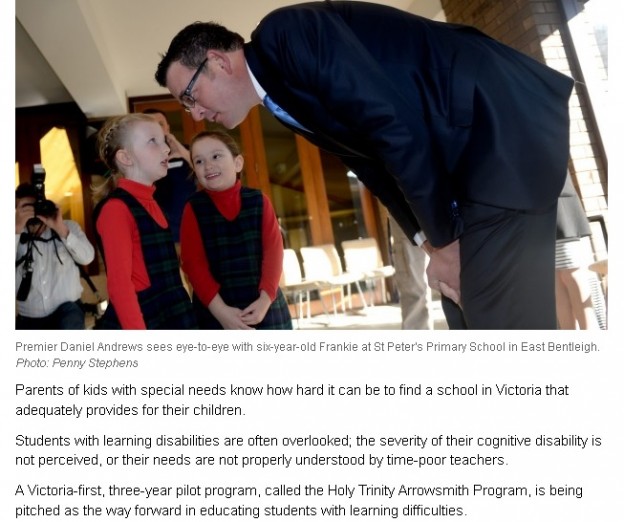Brain training
3 Replies
I was pretty surprised last week to read in The Age newspaper* that our Premier and state Education Minister launched a pilot of the Arrowsmith program at a Catholic school here in Melbourne, and that there was no mention in the article of the controversy surrounding this and other “brain training” programs.
The Arrowsmith program’s website states that it is “founded on neuroscience research”, the first type of which has shown that “different areas of the brain working together are responsible for complex mental activities, such as reading or writing, and that a weakness in one area can affect a number of different learning processes”. But so what? That doesn’t mean that teaching skills that involve the same brain areas as reading and writing will help reading and writing.
The website also says the program is based on research into the “principle of neuroplasticity, which is the ability of the brain to physically change in response to stimulus and activity, to develop new neuronal/synaptic interconnections and thereby develop and adapt new functions and roles believed to be the physical mechanism of learning.”
As Prof Anne Castles and Assoc Prof Genevieve McArthur pointed out in a 2012 article in The Conversation, most people just call “brain training” “learning”. But terms like “brain training” and “neuroplasticity” sound more special and impressive.
The Premier’s media release about the Melbourne program says: “The Arrowsmith program identifies where students are struggling by looking at cognitive capacities, and then helps students address those weaknesses through a series of cognitive exercises”.
My email inbox was suddenly full of messages from members of the Developmental Disorders of Language and Literacy Network expressing concern about this apparent political endorsement of a program for which nobody was aware of any robust scientific evidence. Associate Professor Pamela Snow has explained why in a blog post called “Why not everyone is enthusiastic about the Arrowsmith Program“.
Yes, it is a pilot program, but one that will cost the Catholic Education Office $150,000. One does not typically spend $150,000 on something without being persuaded of its likely value.
The article says, “the organisers are crying out for more funding for the program, which will cost $1.5 million”, and it seems that they have the attention of politicians capable of giving them public funds. Tuition fees at the schools offering this program in Canada cost about $17,000 to $24,000 Australian per student per year, with students attending for three or four years.
We need programs consistent with the well-established scientific evidence about how to help struggling readers and spellers in every school. It’s hard to work out why these should cost $17,000 to $24,000 per student per year, or (based on a 40 week school year) $106 to $150 per student per day. I wish programs consistent with properly-conducted classroom reading and spelling research could be given half this level of funding.
It’s based on neuroscience, it must be good!
In recent years a number of (usually expensive) therapies for students with reading and spelling problems have been marketed as “based on neuroscience” or offering “brain-based learning”, as though children typically learn in their elbows.
But it’s not really valid to argue that discoveries in neuroscience have direct implications for teaching, as Emeritus Professor Max Coltheart explained in a 2012 article which appeared in The Conversation (reproduced in the Learning Difficultes Australia April 2013 Bulletin, if you’re an LDA member and it looks familiar).
Neuromarketing
It’s not just in Education that the marketing value of neuroscience has been recognised.
A blog called “Neurobollocks: debunking pseudo-neuroscience so you don’t have to” has a lot of fun (and uses quite a lot of expletives, don’t say I didn’t warn you) unpacking such marketing, most recently discussing a Porsche ad that claims brain scans show that when a person is in a fighter jet and a Porsche “we can see the excitement centres clearly lighting up” in a similar way, concluding, “based on the results, taking a hard left in a Porsche is actually comparable to taking a hard left in a fighter jet”. Oh gag me with a spoon.
Neurobollocks’s take on “Brain Training” in education is summarised in a post called “Some excellent articles on the neurobollocks of brain training” in April 2013, with links to discussions about CogMed, LearningRx and Lumosity, all of which are marketed here in Australia. Another interesting post on this topic is called “You keep using this word ‘neuroplasticity’, I do not think it means what you think it means“.
If you want to help a struggling reader and/or speller, look for a program that has been shown in properly-controlled scientific research to help struggling readers/spellers like yours, or programs that follow the same logic and use the same types of activities.
Please maintain a healthy skepticism for programs that are sold as “brain training” using marketing materials full of impressive-sounding neurobabble and testimonials, rather than information about how the program is backed up by, or consistent with, the scientific reading/spelling research.
* The image used with this post is a screenshot of last weeks’ article in The Age by Timna Jacks entitled “Pilot Program puts focus on special needs education in Victoria“, and includes a photo by Penny Stephens.




Alison – I have flagged up your posting here:
http://phonicsinternational.com/forum/viewtopic.php?p=2251#2251
Thank you as always for writing what needs to be raised.
Thanks, Debbie! Not sure I always get things right (I hope you and others will quickly tell me if I don’t) but I guess if we all do our best we can help a lot of people find good things and avoid less-good ones.
[…] few of us wrote letters to the paper at the time, and I wrote this blog post, but it's pretty hard to provide an effective after-the-fact reality check of such an apparent […]